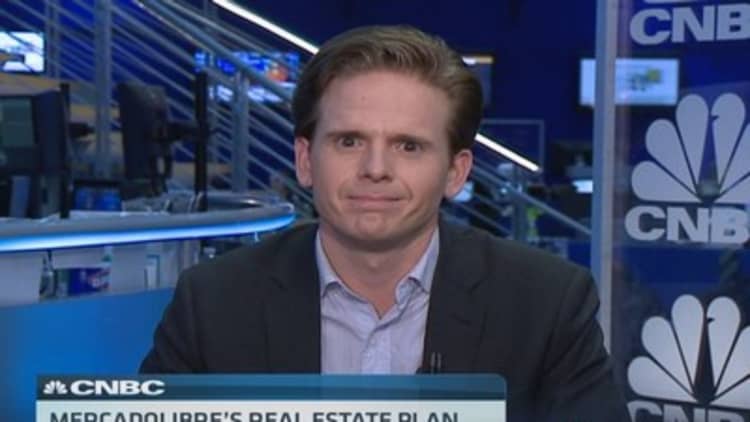
What are profits earned in Venezuela worth? The answer may be less than foreign companies operating there are telling investors.
Among the most exposed to the turbulent country is New York exchange-listed MercadoLibre, which has a business much like eBay's in the largest markets across South America. The online marketplace, in which the actual eBay owns an 18 percent stake, looks promising at first blush, given sales growth of 20 percent or more over the last several years.
The trouble, however, lies in converting that money to U.S. dollars, the currency the company uses to report results. Since the beginning of 2013, the Venezuelan government has refused MercadoLibre's requests to convert the local currency, bolivars, into dollars. And with continued political unrest in the country, it's very hard to predict when things might change. That's a major problem for MercadoLibre, given Venezuela generated around 24 percent of its country-by-country profit last year.
What makes matters worse is that MercadoLibre has been slow to change its reporting to reflect the trapped currency, potentially leaving investors in the dark.
(Read more: Venezuelan turmoil poses little oil threat - for now)
Consider 2013's results, which MercadoLibre generally reported assuming an exchange rate of 6.3 bolivars per dollar. Given that such an exchange rate didn't actually exist for the company, it makes sense to consider black market rates. Late last year, it cost about 45 bolivars to buy one dollar, suggesting any money MercadoLibre tried to bring out of Venezuela might be worth only a sixth of what the company was reporting.
That was a risk pointed out in October by analyst Yaron Reuven, who wrote a note on SumZero, a private network for analysts at hedge funds, mutual funds and private-equity firms. He argued that the real value of MercadoLibre's assets and profits in Venezuela were worth far less than reported, putting investors at risk. The stock has since fallen to about $97 per share from its peak above $140 in late October.
MercadoLibre declined to comment after multiple requests from CNBC Digital.
Even ignoring exchange rates, the local Venezuela business isn't as healthy as it might appear. While MercadoLibre reports rapid growth in local-currency terms, the vast majority of it appears to be the result of runaway inflation. In the fourth quarter, for instance, MercadoLibre said Venezuela's revenue increased 104 percent. But given that units sold rose a modest 12 percent, most of the revenue increase was apparently driven by massive price hikes.
Despite some steps toward clarity, MercadoLibre continues to report profits from Venezuela that may be worth less than they appear. In February, the company said it would shift to an exchange rate of 11.8 bolivars per dollar as of the first quarter. But the company still hasn't been able to exchange bolivars—at 11.8 per dollar or any level.
(Read more: This country is Venezuela's biggest loser)
In a March filing, MercadoLibre provided a "sensitivity analysis" showing how much a devaluation would potentially erode profits. As reported last year under an exchange rate of 6.3 bolivars per dollar, Venezuela generated so-called segment profit of $55 million. But if the exchange rate had been, say, 18.72 bolivars per dollar, the segment profit would have been just $14.7 million. That indicates the entire company's operating income would have fallen to $113 million in 2013 from $130 million in 2012.
But again, even the anecdotal rate of 18.72 bolivars per dollar may not reflect the currency's true weakness, given the company hasn't made any foreign exchange transactions at that rate.
Of course, MercadoLibre has a strategy for preserving the value of cash held in Venezuelan currency. Last year, the company bought two office properties in Venezuela for about 450 million bolivars, more than the profits in made in the country.
But piling into real estate in a country with rapid inflation is hardly a quick fix. If inflation continues, rent income may be eroded before the company can pass on higher rates to tenants. And if the government responds with interest rate hikes to address inflation, it could hurt the economy and demand for commercial property.
Argentina, where MercadoLibre generated another 25 percent of its segment profit in 2013, is another region investors should watch closely. The company itself points out in a filing that during January 2014 alone, the Argentine currency weakened 23 percent from 6.52 pesos per dollar to 8 pesos per dollar. If that inflation continues or MercadoLibre becomes unable to convert pesos to dollars, a situation similar to Venezuela's could arise.
(Read more: Venezuela inflation tops 57 percent amid protests)
There is an argument to be made that a weaker peso could help MercadoLibre because 40 percent of its costs are denominated in the currency. But Michel Morin of Morgan Stanley points out that inflation in Argentina may offset much of that benefit. The company employs many skilled workers and executives within the country whom it may need to pay higher salaries as prices rise. And as in Venezuela, tighter fiscal or monetary policy could quickly drag on the economy.
All of this makes it tough to get a good read on MercadoLibre's underlying performance. A better way may be to look at growth in items sold, which decelerated from 25 percent in the third quarter to 20 percent in the fourth quarter. With MercadoLibre trading at an eye-watering eight times 2014 estimated sales, well above the likes of eBay and or Amazon, investors may want to wait for a better deal on the shares.
—By CNBC's John Jannarone. Follow John on Twitter @jannarone.

